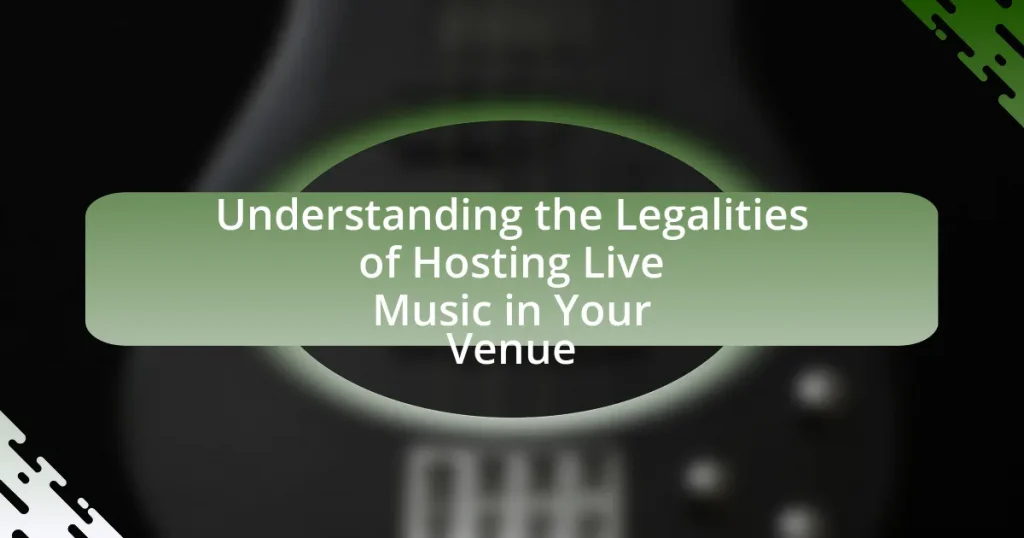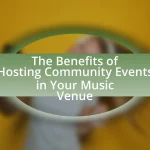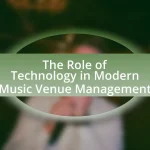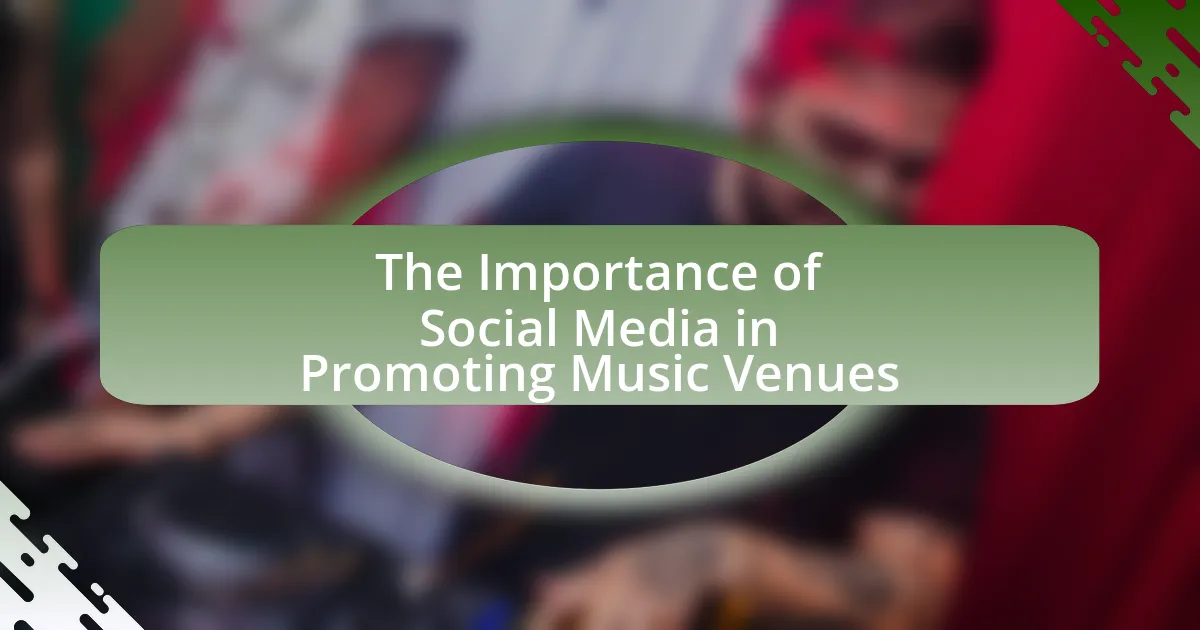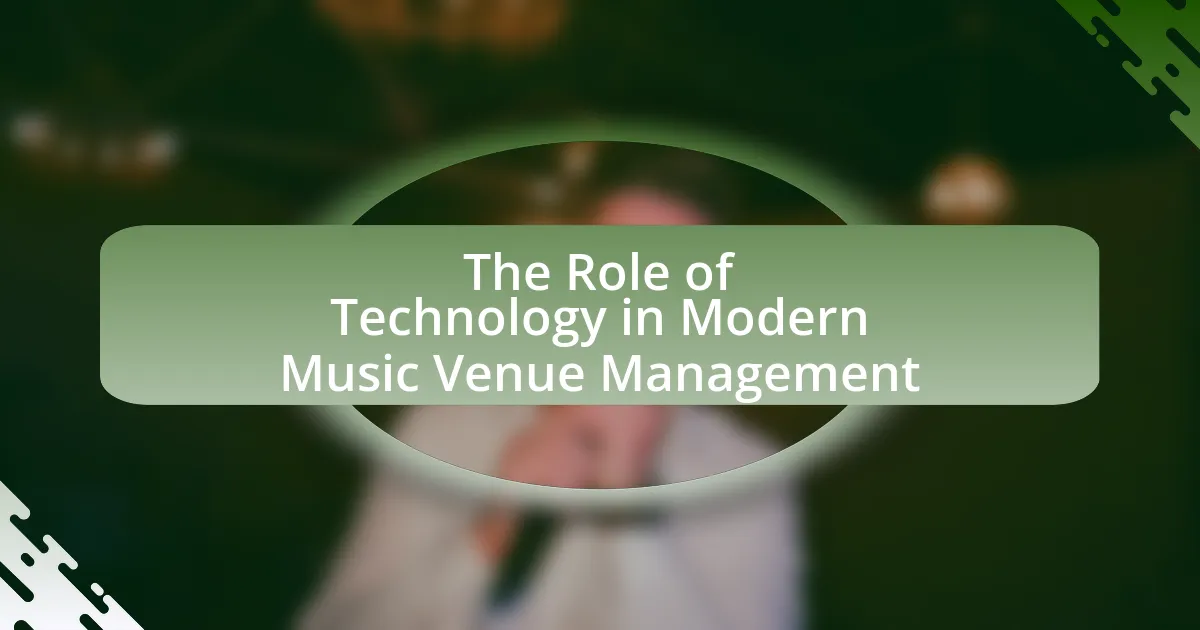The article focuses on the legal considerations involved in hosting live music events at venues. It outlines the necessary licenses and permits, such as performance rights licenses from organizations like ASCAP and BMI, and emphasizes compliance with local noise ordinances and safety regulations. Additionally, it discusses potential liabilities, including personal injury claims and copyright infringement, and highlights the importance of liability insurance. The article also covers best practices for contract management with performers, effective marketing strategies, and solutions for crowd control, providing a comprehensive guide for venue owners to navigate the complexities of hosting live music legally and successfully.
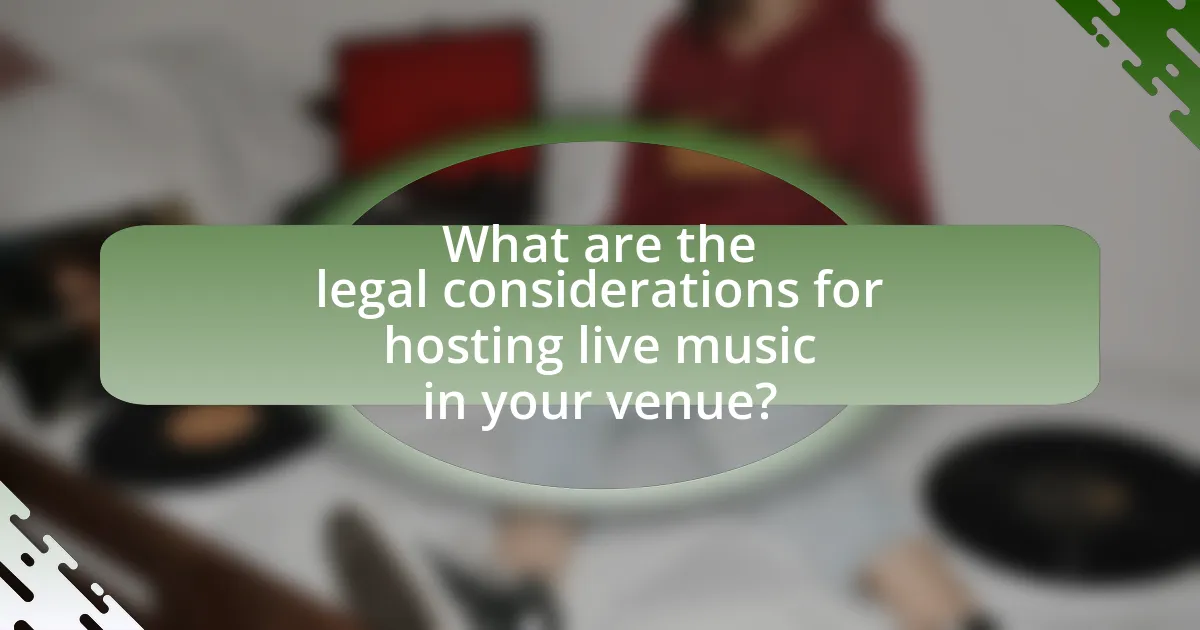
What are the legal considerations for hosting live music in your venue?
To host live music in your venue, you must consider obtaining the appropriate licenses and permits, including performance rights licenses from organizations like ASCAP or BMI. These licenses ensure that you are legally allowed to play copyrighted music, as failure to do so can result in legal action and fines. Additionally, you should comply with local noise ordinances, which regulate sound levels and hours of operation to prevent disturbances. Ensuring that your venue meets safety regulations, such as fire codes and occupancy limits, is also crucial to avoid liability issues. Furthermore, having liability insurance can protect your venue from potential claims arising from accidents or injuries during events.
What types of licenses are required for live music events?
Live music events typically require several types of licenses, including a public performance license, a venue license, and sometimes a special event permit. A public performance license is necessary to legally play copyrighted music in a public setting, which can be obtained from organizations like ASCAP, BMI, or SESAC. Additionally, a venue license ensures that the location complies with local regulations and safety codes. In some jurisdictions, a special event permit may also be required, particularly for outdoor events or those that involve large crowds. These licenses are essential to avoid legal issues and ensure compliance with copyright and local laws.
How do performance rights organizations impact licensing?
Performance rights organizations (PROs) significantly impact licensing by managing the rights of artists and songwriters to ensure they receive compensation for public performances of their work. PROs, such as ASCAP, BMI, and SESAC, collect licensing fees from venues that host live music, distributing these funds to the creators based on usage data. This system not only simplifies the licensing process for venue owners by providing a single point of contact for multiple works but also ensures that artists are fairly compensated for their contributions. In 2021, PROs collectively distributed over $1.5 billion in royalties, highlighting their crucial role in the music industry and the importance of licensing compliance for venues hosting live performances.
What is the process for obtaining a live music license?
To obtain a live music license, a venue owner must first determine the specific licensing requirements based on their location and the type of music being performed. This typically involves applying for a public performance license through a performing rights organization, such as ASCAP, BMI, or SESAC, which manage the rights of songwriters and publishers. The venue owner must provide details about the music events, including the frequency and type of performances, and pay the associated fees. Additionally, local regulations may require permits from city or county authorities, which can include zoning approvals or health and safety inspections. Compliance with these regulations ensures that the venue operates legally and avoids potential fines or legal issues.
What are the potential liabilities associated with live music events?
Potential liabilities associated with live music events include personal injury claims, property damage, and copyright infringement. Personal injury claims can arise from accidents involving attendees, such as slips and falls, which may lead to lawsuits against the venue or event organizers. Property damage can occur if equipment or staging causes harm to the venue or surrounding areas, resulting in financial liability for repairs. Additionally, copyright infringement may happen if music is played without proper licensing, exposing the event organizers to legal action from copyright holders. According to the U.S. Copyright Office, failure to obtain the necessary licenses can lead to statutory damages ranging from $750 to $30,000 per infringement, reinforcing the importance of compliance in live music events.
How can venues protect themselves from legal claims?
Venues can protect themselves from legal claims by implementing comprehensive liability insurance, establishing clear contracts with performers, and ensuring compliance with local laws and regulations. Liability insurance provides financial coverage against claims related to accidents or injuries occurring on the premises, which is crucial given that venues can face lawsuits for various incidents. Clear contracts with performers outline responsibilities and expectations, reducing the risk of disputes. Additionally, compliance with local laws, such as obtaining necessary permits and adhering to safety regulations, minimizes legal exposure. According to the National Association of Venue Managers, venues that follow these practices significantly reduce their risk of legal claims.
What insurance options should venues consider for live music events?
Venues hosting live music events should consider several insurance options, including general liability insurance, event cancellation insurance, and liquor liability insurance. General liability insurance protects against claims of bodily injury or property damage occurring during the event, which is crucial given that live music can attract large crowds and potential accidents. Event cancellation insurance covers financial losses if an event is canceled due to unforeseen circumstances, such as severe weather or illness, ensuring that venues do not suffer significant financial setbacks. Liquor liability insurance is essential for venues serving alcohol, as it protects against claims resulting from alcohol-related incidents, which can lead to lawsuits. These insurance options collectively mitigate risks associated with hosting live music events, providing financial protection and peace of mind for venue operators.
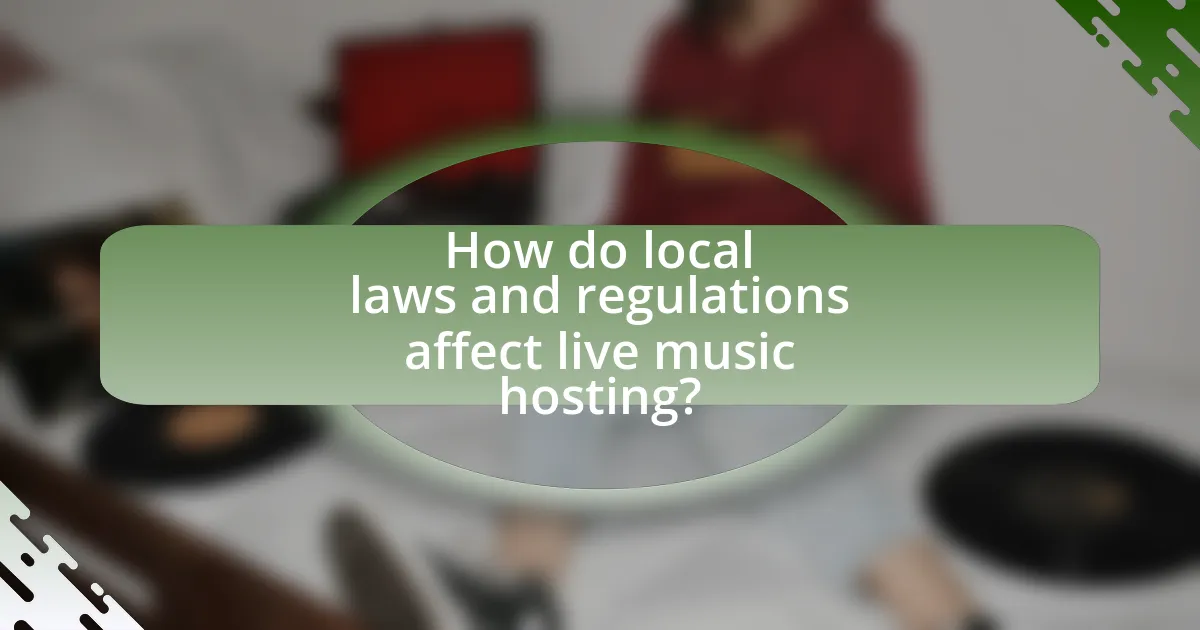
How do local laws and regulations affect live music hosting?
Local laws and regulations significantly impact live music hosting by dictating licensing requirements, noise ordinances, and safety standards. For instance, venues must often obtain specific permits to host live music events, which can include performance licenses and alcohol licenses, depending on local jurisdiction. Additionally, noise ordinances may restrict the volume and hours of live performances, affecting scheduling and audience capacity. Compliance with safety regulations, such as fire codes and occupancy limits, is also essential to ensure the venue operates legally and safely. These legal frameworks are designed to protect public interests, and failure to adhere can result in fines or closure of the venue.
What zoning laws should venues be aware of?
Venues should be aware of zoning laws that dictate land use, noise restrictions, and occupancy limits. Zoning laws vary by municipality and can affect whether a venue can host live music events, the hours during which music can be played, and the maximum number of attendees allowed. For instance, residential zones may impose stricter noise ordinances compared to commercial zones, limiting the volume of music and the duration of events. Additionally, venues must comply with local licensing requirements, which often include obtaining special permits for live performances. Understanding these regulations is crucial for legal compliance and successful event planning.
How do noise ordinances impact live music events?
Noise ordinances significantly restrict the volume levels permitted during live music events. These regulations are designed to minimize disturbances to nearby residents and businesses, often setting specific decibel limits that venues must adhere to. For instance, many cities enforce noise levels not exceeding 60 decibels during the day and 50 decibels at night. Consequently, venues may need to adjust their sound systems, limit performance times, or even cancel events to comply with these laws. Failure to adhere to noise ordinances can result in fines, legal action, or the revocation of a venue’s operating license, thereby directly affecting the viability and profitability of hosting live music events.
What are the consequences of violating local regulations?
Violating local regulations can result in significant legal and financial consequences for venues hosting live music. These consequences may include fines, which can range from hundreds to thousands of dollars depending on the severity of the violation, and potential legal action from local authorities. Additionally, venues may face the suspension or revocation of their operating licenses, which can lead to temporary or permanent closure. For instance, a study by the National Association of Music Merchants highlights that non-compliance with noise ordinances can lead to immediate fines and increased scrutiny from regulatory bodies. Furthermore, repeated violations can damage a venue’s reputation, leading to decreased patronage and potential loss of business partnerships.
How can venues ensure compliance with health and safety regulations?
Venues can ensure compliance with health and safety regulations by implementing a comprehensive safety management system that includes regular risk assessments, staff training, and adherence to local laws. Regular risk assessments identify potential hazards and allow venues to take proactive measures to mitigate risks, ensuring a safer environment for patrons and staff. Staff training is essential, as it equips employees with the knowledge to recognize and respond to health and safety issues effectively. Additionally, venues must stay updated on local health and safety regulations, which can vary by location, to ensure they meet all legal requirements. For instance, the Health and Safety at Work Act 1974 in the UK mandates that employers ensure the health and safety of their employees and the public, reinforcing the need for venues to maintain compliance through diligent practices.
What are the key health and safety standards for live music venues?
Key health and safety standards for live music venues include crowd management, fire safety, structural integrity, and sound level regulations. Crowd management ensures safe entry and exit, often requiring trained staff to monitor audience behavior and control capacity limits. Fire safety standards mandate clear evacuation routes, accessible fire extinguishers, and compliance with local fire codes, which are critical for protecting patrons in emergencies. Structural integrity involves regular inspections of the venue’s physical elements, such as stages and seating, to prevent accidents. Sound level regulations are enforced to protect both performers and attendees from hearing damage, often requiring venues to monitor and limit decibel levels in accordance with local noise ordinances. These standards are essential for ensuring the safety and well-being of everyone involved in live music events.
How can venues prepare for inspections related to live music events?
Venues can prepare for inspections related to live music events by ensuring compliance with local regulations, safety standards, and operational protocols. This includes obtaining necessary permits, conducting regular safety audits, and maintaining equipment to meet health and safety codes. For instance, venues should verify that fire exits are accessible, sound systems are properly installed, and crowd control measures are in place. Additionally, staff should be trained on emergency procedures and the venue should have documentation readily available, such as insurance certificates and risk assessments, to demonstrate adherence to legal requirements. This proactive approach not only facilitates smoother inspections but also enhances overall safety and compliance during live music events.
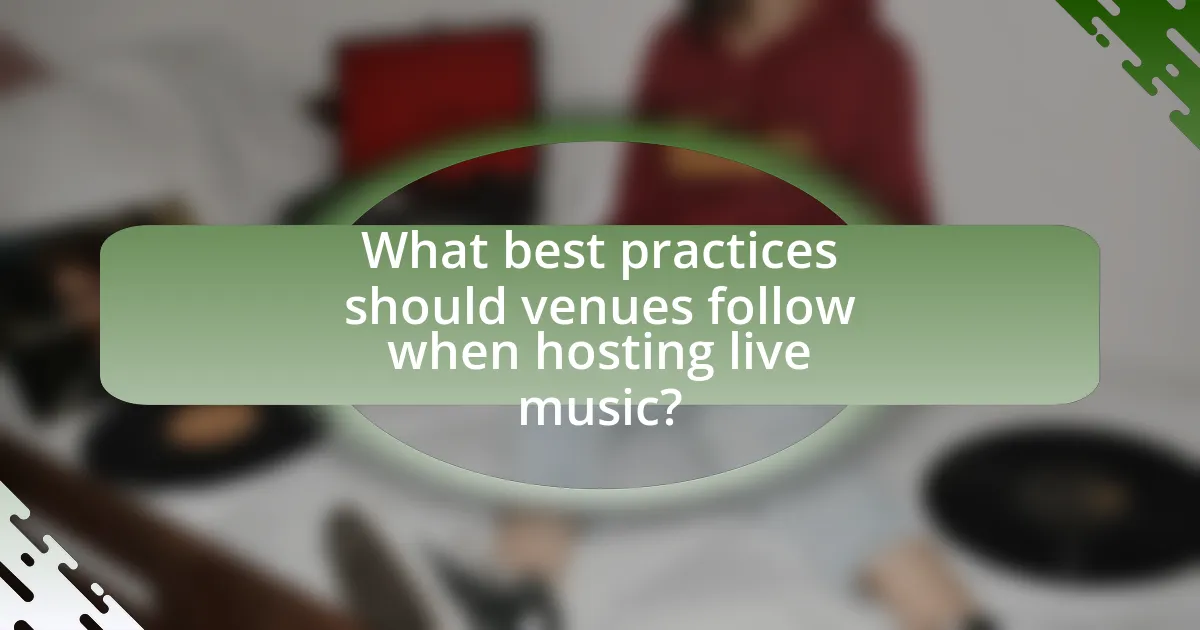
What best practices should venues follow when hosting live music?
Venues should prioritize obtaining the necessary licenses and permits when hosting live music to ensure compliance with local laws. This includes securing performance rights from organizations like ASCAP or BMI, which manage music licensing for artists. Additionally, venues must adhere to noise ordinances to avoid fines and maintain good relations with the surrounding community. Implementing safety measures, such as crowd control and emergency protocols, is also essential to protect attendees and staff. Furthermore, venues should establish clear contracts with performers that outline payment terms, performance expectations, and liability issues. These practices not only safeguard the venue legally but also enhance the overall experience for both artists and audiences.
How can venues effectively manage contracts with performers?
Venues can effectively manage contracts with performers by implementing a structured contract management system that includes clear terms, deadlines, and communication protocols. This system should ensure that all agreements are documented, easily accessible, and regularly reviewed to maintain compliance with legal standards. For instance, utilizing contract management software can streamline the process, allowing venues to track obligations and deadlines efficiently. Additionally, establishing a standard contract template that outlines payment terms, performance expectations, and cancellation policies can minimize disputes and enhance clarity. Research indicates that venues that adopt such systematic approaches experience fewer legal issues and improved relationships with performers, as evidenced by a study from the National Association of Venue Managers, which found that 75% of venues reported enhanced operational efficiency through effective contract management practices.
What key elements should be included in performance contracts?
Performance contracts should include key elements such as the scope of work, payment terms, performance dates, cancellation policies, and liability clauses. The scope of work defines the specific services to be provided, ensuring clarity on expectations. Payment terms outline the compensation structure, including amounts and due dates, which is crucial for financial planning. Performance dates specify when the event will occur, preventing scheduling conflicts. Cancellation policies detail the conditions under which either party can terminate the agreement, protecting both sides from unforeseen circumstances. Liability clauses address responsibilities for damages or injuries, ensuring legal protection for all parties involved. These elements are essential for creating a comprehensive and enforceable performance contract in the context of hosting live music events.
How can venues negotiate fair terms with artists?
Venues can negotiate fair terms with artists by establishing clear communication and mutual understanding of expectations. This involves discussing key elements such as performance fees, revenue sharing, and logistical support upfront. For instance, a study by the National Endowment for the Arts highlights that transparent negotiations lead to better long-term relationships between venues and artists, resulting in more successful events. By ensuring that both parties feel valued and understood, venues can create agreements that are equitable and beneficial for both sides.
What strategies can enhance the success of live music events?
To enhance the success of live music events, effective marketing strategies must be implemented. Utilizing social media platforms to promote events can significantly increase visibility and audience engagement, as studies show that 78% of event attendees discover events through social media. Additionally, collaborating with local influencers can amplify reach and attract diverse audiences. Ensuring a seamless ticketing process, including options for early bird pricing and group discounts, can also boost sales and attendance. Furthermore, creating a unique experience through themed events or interactive elements can differentiate the event and encourage word-of-mouth promotion. These strategies collectively contribute to higher attendance rates and overall event success.
How can marketing efforts impact attendance at live music events?
Marketing efforts significantly impact attendance at live music events by increasing visibility and engagement with potential audiences. Effective marketing strategies, such as targeted social media campaigns, email newsletters, and partnerships with influencers, can create buzz and anticipation around an event, leading to higher ticket sales. For instance, a study by Eventbrite found that events promoted through social media channels saw a 30% increase in attendance compared to those that were not. Additionally, well-crafted promotional materials that highlight unique aspects of the event, such as special guests or exclusive experiences, can attract more attendees. Thus, strategic marketing directly correlates with increased attendance at live music events.
What role does audience engagement play in successful live music hosting?
Audience engagement is crucial for successful live music hosting as it directly influences the overall experience and satisfaction of attendees. Engaged audiences are more likely to participate actively, leading to higher energy levels during performances, which can enhance the atmosphere and encourage repeat attendance. Research indicates that events with high audience interaction can see up to a 30% increase in ticket sales and merchandise purchases, demonstrating the financial benefits of fostering engagement. Additionally, engaged audiences often share their experiences on social media, amplifying the event’s reach and attracting new attendees, thereby solidifying the venue’s reputation and success in hosting live music events.
What are the common challenges faced by venues hosting live music?
Venues hosting live music commonly face challenges such as noise regulations, licensing requirements, and crowd management. Noise regulations can vary significantly by location, requiring venues to monitor sound levels to avoid fines or complaints from neighbors. Licensing requirements often include obtaining permits for live performances, which can be complex and time-consuming, potentially delaying events. Additionally, crowd management poses a challenge, as venues must ensure safety and compliance with fire codes, which can be particularly difficult during high-attendance events. These challenges necessitate careful planning and adherence to local laws to successfully host live music events.
How can venues address noise complaints from neighbors?
Venues can address noise complaints from neighbors by implementing soundproofing measures and establishing clear communication channels. Soundproofing techniques, such as installing acoustic panels and using double-glazed windows, can significantly reduce noise leakage, thereby minimizing disturbances to nearby residents. Additionally, venues should proactively engage with the community by informing neighbors about upcoming events and providing contact information for noise-related concerns. This approach fosters goodwill and allows for timely resolution of issues. Studies indicate that venues that maintain open lines of communication with their neighbors experience fewer complaints and improved community relations.
What solutions exist for managing crowd control during events?
Solutions for managing crowd control during events include the use of trained security personnel, crowd management technology, and effective communication strategies. Trained security personnel can monitor crowd behavior and respond to incidents, ensuring safety and compliance with legal regulations. Crowd management technology, such as surveillance cameras and crowd monitoring software, provides real-time data on crowd density and movement, allowing for proactive measures to prevent overcrowding. Effective communication strategies, including clear signage and announcements, help guide attendees and reduce confusion, further enhancing safety. These methods are supported by industry standards and best practices, which emphasize the importance of planning and preparedness in crowd control management.
What practical tips can help ensure a successful live music event?
To ensure a successful live music event, it is essential to plan meticulously and comply with all legal requirements. First, secure the necessary permits and licenses, such as performance rights and venue permits, to avoid legal issues. According to the American Society of Composers, Authors and Publishers (ASCAP), failure to obtain proper licensing can result in fines and legal action. Next, create a detailed event schedule that includes sound checks, set times, and breaks to keep the event organized. Additionally, promote the event effectively through social media and local advertising to attract a larger audience. Engaging with the community and local influencers can enhance visibility and attendance. Finally, ensure that safety measures are in place, including crowd control and emergency protocols, to protect attendees and comply with local regulations. These steps collectively contribute to a successful live music event while adhering to legal standards.
